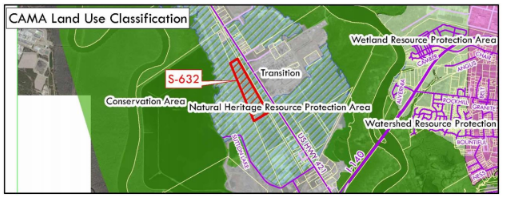WILMINGTON – A proposed revision of New Hanover County’s industrial special-use permit clearly identifies industries, their potential effects and gives the public a greater voice in shaping the county’s future, its proponents say.
The suggested changes to the special-use permit, or SUP, are the result of months of discussions, debates and compromises hashed out by a community task force led by the North Carolina Coastal Federation.
Supporter Spotlight
The federation kicked off on Aug. 17 its “My Community: My Voice” campaign in downtown Wilmington to gain public support for its “model industrial SUP.”
A special-use permit is granted to allow a land use that does not fall directly under permitted usages in a specifically zoned area. Local governments can use the SUP process to review new industry’s potential effects, including the environment and public health.

“We have done a gentleman’s job trying to improve something good for the community,” said Mike Giles, a coastal advocate in the federation’s Wrightsville Beach office. “The county has a choice now on which way and how it grows. This is an effort to improve the process by being clearer and better organized.”
While the federation is marketing its proposed version in radio and television spots and on social media, the New Hanover County Planning Board will in the coming days look at what suggested changes the county has put forward in zoning ordinance amendments.
Shortly after receiving the proposed model industrial SUP, the county released a different set of proposed changes based on recommendations from its consultant, Michigan-based LSL Planning.
Supporter Spotlight
Leaders with the Wilmington Chamber of Commerce are reviewing the county’s proposal. Chamber Chairman Mitch Lamm wrote in an Aug. 18 email to chamber members that he does not support the federation’s model industrial SUP.

“The Chamber recommends that upcoming deliberations on this issue focus on the County staff’s new proposal,” Lamm wrote. “The North Carolina Coastal Federation’s campaign to build support for what they have dubbed the ‘model’ Special Use Permit (SUP) is not supported by the Wilmington Chamber. In 2015, the Coastal Federation created a community task force and hired a consultant to develop a revised version of the SUP. Once drafted by the Coastal Federation’s consultant, that proposal did not receive a majority of support from the members of the committee not employed by the Coastal Federation. The Coastal Federation proposal does not represent a community consensus on this issue and does not adequately address the business community’s concerns.”
Giles said Lamm had not discussed the federation’s final proposed version submitted to the county. Lamm did not respond to a request for comment.
Wilmington City Councilman Kevin O’Grady was a member of the project team that created the model industrial SUP.
“I think this model industrial plan is a great plan,” he said. “It was tough going through and getting the language written in a way that balances the interest of business and the environment. We do want businesses to come here. This allows a little more scrutiny on those businesses that impact the environment.”

New Hanover County adopted a SUP for industry in 2011. Pressure from business groups that claim the SUP deters economic growth prompted county staff and the planning board in 2014 to make permit revisions. Their suggestions sparked concerns among residents and environmental groups, who feared some of the proposed changes loosened the vetting process for intense industry and manufacturing.
This was also during the nearly decade-long battle some area residents and environmental groups fought to keep Titan America from building a cement plant in Castle Hayne. The proposed plant, which was expected to start production in 2011, prompted concerns about the potential effects on air quality, groundwater and human health. Citing regional market conditions, the company in March announced it was axing plans for the Castle Hayne plant.
“Titan was a hard-fought victory, but it very much changed our community,” Tracy Skrabal, a coastal scientist and manager of the federation’s regional office in Wrightsville Beach, said to an audience of more than 50 people who attended the meeting to start the “My Community: My Voice” campaign. “Titan woke up this community.”

With a $25,000 grant from the Lillian Goldman Charitable Trust, the federation hired a Charlotte-based consultant and pulled together a group of stakeholders, including the Wilmington Chamber of Commerce, New Hanover County Airport Authority, representatives from the county’s beach towns, professors from the University of North Carolina at Wilmington and General Electric representatives. In all, a task force of about 15 people met in round after round of “lively” discussions, Giles said.
The end result is a revised industrial SUP that distinguishes low-impact and heavy industry, provides a comprehensive review of heavy polluting industries, establishes clear language, a predictable timeline and specific guidelines for applicants, said Karen Dunn, the federation’s clean communities coordinator.
“One of the major benefits is the checklist we have established,” Dunn said. “We have constantly heard from one spectrum to the other the question ‘what is required?’ This checklist gets rid of that vagueness. It puts it in a clean and concise format.”

The checklist, a table of permitted uses created by the North American Industry Classification System, lets an industry know whether it is permitted by right to operate within a specified zoning district.
The model industrial SUP increases the amount of time the county gets to review heavy industries, such as nuclear power plants, cement plants and large chemical plants. The revised proposal also requires the county hold a community information meeting before such industries filing a permit application.
The revisions also prohibit mining deeper than 35 feet.

S.T. Wooten is asking the county to grant the Wilson-based company’s request to expand its existing sand mine operation off U.S. 421 near Duke Energy’s Sutton Plant. The company wants to mine roughly 80 additional acres. Material from the mine will be used to fill the coal-ash ponds at the plant.
The company wants to dig to a depth of 55 feet, which raises questions about potential effects on the Peedee aquifer.
The New Hanover County Planning Board is reviewing the county’s proposed zoning ordinance amendment during a work session at 3 p.m. Tuesday at the county’s government center, 230 Government Center Drive. The board’s next meeting is Sept. 8.

It is unclear when the issue will go before county commissioners, though there is speculation that that will not happen until after the Nov. 8 election. There are three open seats on the board.
Commissioner Rob Zapple’s four-year term expires in 2018.
“For the last five, six years, we’ve seen how this impacts our community,” he said. “We are talking about the future of New Hanover County. New Hanover County needs a strong SUP process.”
Correction: This story was corrected at 10:30 a.m., Aug. 24. It had incorrectly reported that Commissioner Rob Zapple supports the model SUP devised by the North Carolina Coastal Federation and others. He says he supports a stronger SUP process.







